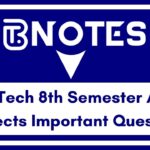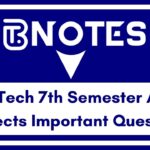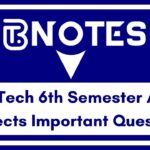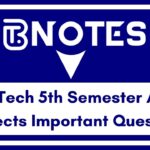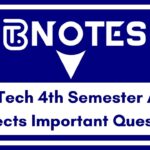The Bachelor of Technology (B.Tech) is a four-year undergraduate program that progresses from foundational learning in the first year to specialized, in-depth study in later semesters. The 4th semester for Computer Science and Engineering (CSE) students builds on the core concepts introduced in the 3rd semester, focusing on advanced programming, system design, and theoretical foundations critical to the field.
This syllabus represents a typical CSE curriculum for the 4th semester, emphasizing skills in algorithm design, database management, and operating systems. While the exact subjects may vary by institution, this structure prepares students for real-world applications and further specialization in areas like artificial intelligence and software engineering.
B Tech 4th Semester Syllabus
Duration: Approximately 5-6 months (including classes, labs, and exams).
Focus: Advanced core CSE concepts, system-level understanding, and practical skills.
Theory Subjects
1. Discrete Mathematics
- Topics:
- Sets, Relations, and Functions: Properties, Equivalence Relations.
- Graph Theory: Paths, Cycles, Connectivity, Trees.
- Logic: Propositional and Predicate Logic, Proof Techniques.
- Combinatorics: Permutations, Combinations, Recurrence Relations.
- Objective: Provides mathematical foundations for algorithms and computer science theory.
2. Design and Analysis of Algorithms
- Topics:
- Algorithm Design Techniques: Divide and Conquer, Greedy, Dynamic Programming.
- Time and Space Complexity: Big-O, Omega, Theta Notations.
- Sorting and Searching: Merge Sort, Quick Sort, Binary Search.
- Graph Algorithms: Shortest Paths (Dijkstra’s, Bellman-Ford), Minimum Spanning Trees.
- Objective: Teaches efficient algorithm design and performance analysis.
3. Operating Systems
- Topics:
- OS Structure: Processes, Threads, CPU Scheduling.
- Memory Management: Paging, Segmentation, Virtual Memory.
- File Systems: Directory Structure, File Operations.
- Synchronization: Deadlocks, Semaphores, Monitors.
- Objective: Introduces principles of system resource management.
4. Database Management Systems (DBMS)
- Topics:
- Data Models: Relational Model, ER Diagrams.
- SQL: Queries, Joins, Subqueries, Triggers.
- Normalization: 1NF, 2NF, 3NF, BCNF.
- Transaction Management: ACID Properties, Concurrency Control.
- Objective: Covers data storage, retrieval, and management techniques.
5. Microprocessors and Microcontrollers
- Topics:
- Architecture: 8085/8086 Microprocessor, Instruction Set.
- Interfacing: Memory, I/O Devices.
- Assembly Language Programming.
- Microcontrollers: Basics of 8051, Applications.
- Objective: Explores low-level programming and hardware interaction.
Practical/Lab Subjects
| Lab | Experiments/Activities | Objective |
|---|---|---|
| Algorithms Lab | Implementation of sorting and searching algorithms.Graph-based algorithms (e.g., Dijkstra’s, Prim’s).Dynamic programming problems. | Practical application of algorithm design techniques. |
| Operating Systems Lab | Simulation of CPU scheduling algorithms.Memory management programs.Shell scripting and process synchronization. | Hands-on experience with OS concepts. |
| DBMS Lab | Creating and querying databases using SQL.Designing ER models and normalization.Implementing basic transaction management. | Reinforces database design and querying skills. |
| Microprocessor Lab | Assembly language programming (e.g., 8085/8086).Interfacing experiments with LEDs, keyboards.Microcontroller-based mini projects. | Practical understanding of microprocessor operations. |
Assessment
- Theory: End-semester exams (typically 60-70% weightage) + Internal assessments (assignments, quizzes, midterms; 30-40% weightage).
- Practicals: Lab performance, viva voce, and lab records.
- Credits: Each subject usually carries 3-4 credits (theory) or 1-2 credits (labs), totaling around 20-24 credits for the semester.
Notes
- Variations: Some institutions might include “Software Engineering” or “Computer Networks” in this semester, shifting subjects like “Microprocessors” to later semesters.
- Branch-Specific: This syllabus is for CSE; other branches might feature subjects like “Strength of Materials” (Mechanical) or “Structural Analysis” (Civil).
Conclusion
The 4th semester of the B.Tech program in Computer Science and Engineering solidifies students’ expertise in core areas like algorithms, operating systems, and databases. By blending theoretical depth with practical labs, it equips learners with the skills to design efficient systems and manage data effectively—key competencies in the tech industry.
This semester bridges foundational knowledge with advanced topics, preparing students for specialized electives and projects in the coming years. Successfully navigating this phase enhances their ability to tackle complex computational challenges and lays a robust foundation for a career in computer science.
More Resource:

